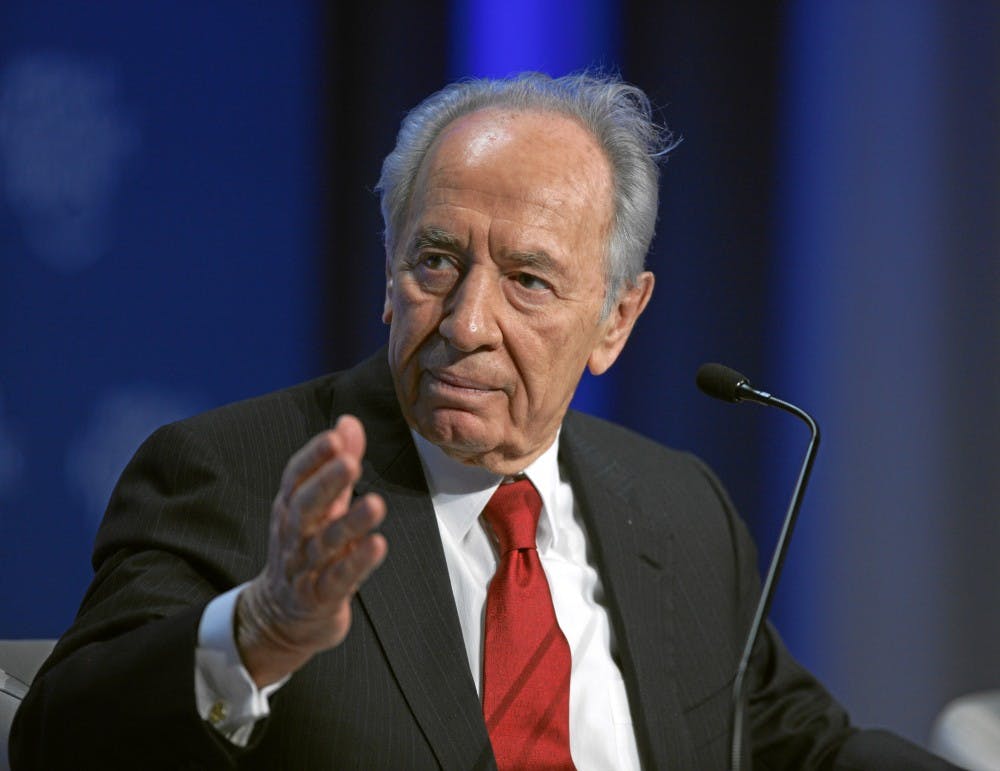TO THE EDITOR:
Shimon Peres leaves behind a legacy of unwavering devotion and service to the state and people of Israel. His lifelong mission for peace, however, transcends nationality and explains his global influence. No one's legacy is flawless, yet by examining Peres' legacy we learn important lessons.
Peres cannot be defined solely by his mistakes. We cannot, and should not, judge people on whether they're purely good or purely bad. More importantly, Peres, like Israel, shouldn't be held up to an impossible standard.
The Arab-Israeli conflict is enduring and complex, and cannot be attributed to one side, let alone one person. If nothing else, Peres taught us that, just as one side cannot be entirely blamed for the conflict, one side cannot be entirely responsible for the solution. A two-sided conflict requires a solution that understands, sympathizes with and addresses both sides.
Although Peres cannot be called the sole voice of Israel, or the main actor in the conflict, it is fair to call him a leading visionary of Israel. The New York Times described him as a "founding pioneer who set an example for forward thinking by promoting the country's high-tech prowess and cultural reach."
Peres' fierce loyalty to his dream for peace, in the face of vocal criticism, resulted in numerous advancements towards cooperation, including the 1993 Oslo Accords. In 1993, he signed the accords which established self-government in Gaza and the West Bank. It was an unprecedented agreement between Israel and the Palestinian Liberation Organization.
Another Peres initiative was establishing the Peres Center for Peace in Jaffa, Israel that implements programs in various fields including agriculture and sports, in addition to fostering a dialogue between Palestinians and Israelis as well as between Arabs and Jews.
Peres' tireless efforts and achievements did not go unnoticed. He was awarded the French Legion of Honor in 1957, the Nobel Peace Prize in 1994 and the Presidential Medal of Freedom from President Obama in 2012.
One need only to look at the impressive collection of world leaders who attended Peres' funeral and who commented on his death to understand the global influence he had. Thousands of mourners and leaders came from over 75 countries, including: President Barack Obama, the presidents of France, Germany and Mexico, Palestinian Authority President Mahmoud Abbas, King Felipe VI of Spain, Prince Charles and Egypt's Foreign Minister, gathered to remember him.
Abbas tweeted in Arabic that "Shimon Peres' death is a heavy loss for all humanity and for peace in the region." Abbas' presence at the funeral marked a historic and hopeful moment as he entered Israel for the first time in six years and shook Israeli Prime Minister Benjamin Netanyahu's hand. Even in death, Peres captured the attention of the world and brought people -- from different backgrounds, religions and opinions, together.
Peres defied many people who see the world in black and white, who fail to realize that peace requires exploration of the gray areas. When people refuse to consider perspectives that contradict their one-sided narratives, it renders them close-minded and unable to work together towards a solution.
Peres was not impaired by close-mindedness; instead, he tried to approach those who might not approach him. He showed us that, when you come to the negotiation table, you need to be willing to compromise, just as the other side must be. He didn't use the word 'peace' for nothing -- he meant it, and he wanted people to believe in it too.
Much can, and should, be learned from Shimon Peres' story. Former British Prime Minister Tony Blair said it best in his eulogy: "Though he grew older, his spirit never did. Above all, his commitment to peace and his belief that it was in the interests of the country he adored marked him out as a visionary whose vision was never dimmed or displaced. He saw every setback as a spur to further action and every moment of hope as a sign of what could be done." He continued, "The whole world will mourn his passing, but his memory will live on to inspire future generations to walk in his path."
Shimon Peres devoted his life to Israel and the security and prosperity of all of its people. He strove to create an oasis in the desert guided by the light of morality and might of hard work and dignity. He understood that peace was integral to realizing his vision, and that it hinged on the cooperation of people on both sides.
He saw opportunity in the chasm and chased it until the end: "In spite of our differences, we can build peace, not just negotiate peace. We can create the proper environment, and not just become victims of the existing environment."
May his memory be a blessing.
Jill Teitelbaum
President, Miami Students for Israel
teiteljh@miamioh.edu

